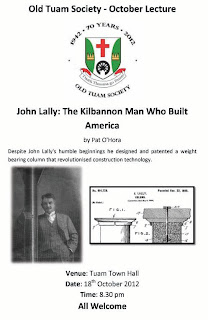March Lecture 2017 - Tom Glynn: A Galway Born 1916 Rebel in Australia
Tom Glynn (1881-1934) is notable as one of the ’Sydney
Twelve’ charged with treason in 1916 (though convicted of the lesser charge of
seditious conspiracy) for opposition to Australian participation in World War
and to conscription. Another of the ‘Twelve’ was Peter Larkin, brother of ‘Big
Jim’.
We are delighted to welcome back lecturer Dr. John Cunningham, Dept of History, NUI Galway. John has been an esteemed contributor to our talks and JOTS over the years and this lecture should prove equally engaging. A former editor of Saothar: journal of Irish Labour History, John's research interests include Irish local history, the moral economy, and global syndicalism and his numerous include St. Jarlath's College, Tuam: 1800-2000 and ‘A town tormented
by the sea': Galway, 1790-1914.
Born in Gurteen, Co. Galway, to a family with strong Monivea
connections, Glynn emigrated at 17 with a brother to join uncles in Kensington,
Melbourne. He subsequently became a trade union activist and was imprisoned in
South Africa in 1911 for his role in organising two tramway strikes.
Returning to Sydney, he was the founding editor of the Industrial
Workers of the World’s (IWW) Australian newspaper, Direct Action. On the outbreak of World War One, Direct Action became an outspoken and
provocative opponent of ‘militarism’,
frequently breaching censorship laws. In its pages, Glynn drew on his
experience as a teenage soldier to denounce war. As the conflict advanced, his
IWW union was the left-wing of a broader movement against conscription which
included Archbishop Mannix and feminists like Adela Pankhurst.
A consequence of Direct Action’s outspokenness was the
proscription of the paper and the incarceration and deportation of many of the
IWW’s principal agitators. The travails of the ‘Sydney Twelve’ in prison, were
described by one of them, Donald Grant, in Through
Six Gaols (1921).
Glynn was among the ten of the ‘Sydney Twelve’ freed in
1920, following a vigorous campaign by a Release Committee. Head-hunted by the
nascent Communist Party, he was the first editor of its periodical The Australian Communist. Soon
disenchanted by the fractious Communist milieu, however, he became a supporter
of Jack Lang, a member of the Labor Party, and a writer on economics on The Labor Daily.
Glynn suffered from poor health in his later years,
attributed by his family to ill-treatment in prison. On his death, aged 53, in
December 1934, the Labor Daily
eulogised a ‘steadfast fighter who served
the Australian Labor Movement staunchly and selflessly during one of the momentous
periods of its history.’
Thursday, 23 March, 2017 @ 8pm
Tuam Library, High Street.
All Welcome!


Comments
Post a Comment